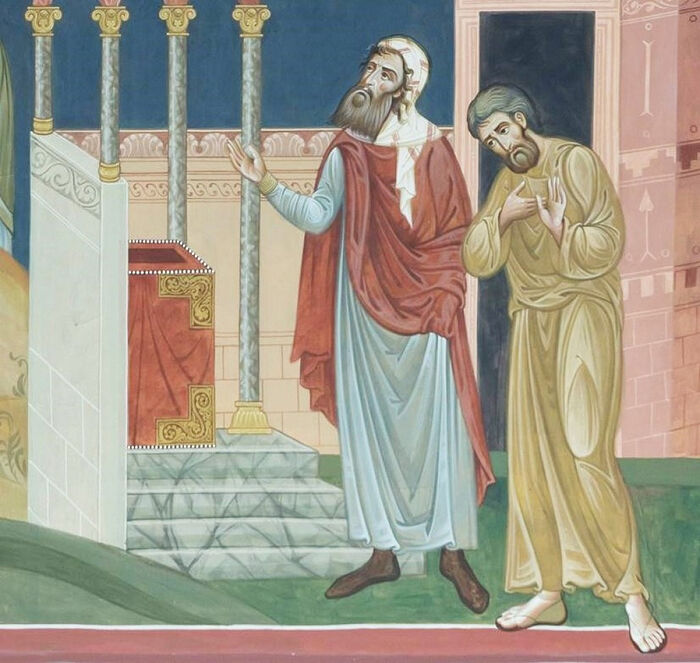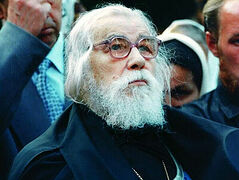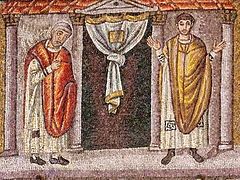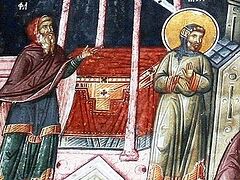On these four Sundays which precede the Great Fast, also known as the preparation for the Lenten season, the Church presents us with the fundamental principles upon which we must build our forty-day fast. On the first Sunday, called the Sunday of the Publican and the Pharisee, the Biblical parable reveals to us the spirit with which we must fast and pray during the upcoming fast.
The essential meaning of this biblical passage revolves around two essential themes: pride and conceit on the one hand, and humility and repentance on the other. The first two are nothing but rotten and fake worship of Christ, whereas the last two are the foundations of salvation in Christ. Our salvation depends on how we worship God. Our worship of God can justify us, but it can also judge us. In the Church, we worship the True God, but our worship can become self-centered.
In the Church, Pharisaism has become a symbol for pride and haughtiness. Some use it from a moralistic point of view to indicate an epidemic in society; others use it to describe anyone who doesn't agree with their stances and thoughts.
Christ rejected pharisaic pride and judged it, not only because pride destroys all virtue in the believer, but rather because it destroys all sense of truth in him. The beginning of pride appears in judging others, self-justification, and self-righteousness. The sin of self-justification is the antithesis of repentance; it not only makes a man seem righteous in his own eyes, but also feeds his egotism and attachment to his own thoughts and will. These serious passions are a veil over our spiritual eyes.
It’s precisely for this reason that the Pharisee didn’t see the need to seek God’s mercy and the forgiveness of his sins. And whoever sees only his own righteousness judges others easily and despises them. This is why every fall in history, and every heresy that grew up in the world was primarily caused by pharisaic pride and self-righteous conviction. Man will never humble himself and feel the weight of his sins so long as he counts his feats and takes pride in his great works. The enumeration of feats and taking pride in them is the primary fuel for pride.
And most Christians live a sort of “popular Christianity” that feeds the spirit of egotism, so they easily fall prey to the passions of conceit, vainglory, pride … and heresy. Christ wanted to warn us from falling into these deadly passions when He said: Woe unto you, when all men shall speak well of you! (Lk. 6:26)
From the standpoint of faith, true Pharisaism comprises this darkness into which the prideful soul falls, so that it no longer differentiates between what is from the spirit of God and what is from the spirit of the devil. This soul becomes unable to discern truth from delusion. Only the humble are truly spiritual because they obey the Church, its faith, and its canons, and God grants them the gift of discernment and the ability to separate what is true from false teachings that disfigure this truth.
These are the teachers and Fathers of the Church and the defenders of its faith. This is the constant struggle between cursed pride and blessed humility, Pharisaism and obedience, self-reliance and repentance; this struggle will accrue as we advance towards the end. The sin of Pharisaism is not that the soul strays from the truth, but that it insists on its delusion despite being shown the truth; and it misleads others into error while suggesting that they’re in the right. Pharisaism is blindness to the truth when the truth is fully present before us.
Pharisaism isn’t the obstinate adherence to our Orthodox faith and calling false teachers heretics, but the pathological adherence to our personal convictions which oppose the teachings of the Church, and stem from a worldly spirit and the instabilities of the New Age. Christ didn’t judge the sinner, but He Himself judged the heretic, when He said that all blasphemies are forgiven, but he that shall blaspheme against the Holy Spirit hath never forgiveness, but is in danger of eternal damnation (Mk. 3:29). Our Holy Fathers understand unforgiveable blasphemers as heretics and false teachers.
Our Christ is the Christ of the humble, who bless what the Church blesses and anathemize what it anathemizes. Such people commit no sin against God, nor against men, nor against the faith, nor against love. Love doesn’t unify mankind—orthodox faith in God is what unifies men, in a way that is internal and intimate. When they believe the same faith, they become one, and love then seals this unity, through the participation in the one Body and Blood of Christ.
Whoever reads about the path of the Church throughout the New Testament with a humble mind clearly sees that it’s a path with a single faith which unites us to Jesus Christ—the one true faith that resists all distorted and crooked teachings. “Love,” as the Apostles of the New Testament use the term, is nothing but an affirmation of this union—with each other and with God—for those united by the one faith, which is activated by partaking of Christ’s holy Body and Blood in the Eucharist. As for love that isn’t built on the one faith, it’s but an external, pharisaic love, a hypocritical love, like the love that the Pharisee displayed towards God and his fellow men in his prayer, fasting, and almsgiving.
The Pharisee thought he was justified by his works, so he enumerated them and relied on them. As for the Publican, he relied on his faith in God; the strength of that faith is revealed when he seeks the mercy of God with such a contrite spirit. The sincerity of man’s faith is revealed by the frank confession of his sins before a spiritual father in the Church, and his faith is strengthened by seeking the mercy of God with unwavering insistence. And the publican, standing afar off, would not lift up so much as his eyes unto Heaven, but smote upon his breast, saying, God be merciful to me a sinner (Luke 18:13). These are the signs of true repentance and self-knowledge; David the prophet describes them as follows: A sacrifice unto God is a broken spirit, a heart that is broken and humbled, God will not despise (Ps. 50:17).
The Pharisee prayed like any other person, but a prayer like his, with a spirit that is haughty and unaware of its sins, is a prayer offered to the demons, not to God. He who prays truly must be filled with compassion for others and love—not judgement—for sinners. The Pharisee took pride in his fasting, while the goal of fasting is to break and humble the soul, so that it may advance in control over the bodily passions, the purification of thoughts, and renunciation of earthly cares. He took pride in tithing all his belongings, while the goal of tithing is to transform our egotism into sensitivity to others, and to free us from avarice and the love of money. This is the pharisaic spirit that is opposed by the humble spirit—a spirit that loves Christ more than itself.
This is the beginning of our journey towards Pascha. The Church teaches us through this parable to accompany fasting with humility, that we might grow in the holy faith, self-knowledge, and awareness of our sins. The goal of fasting is to heal the soul from its corrupt desires, spiritual ailments, and perverse tendencies. But fasting is sterile without focused prayer, and heartfelt prayer doesn’t exist without humility, sighs, and repentance.




